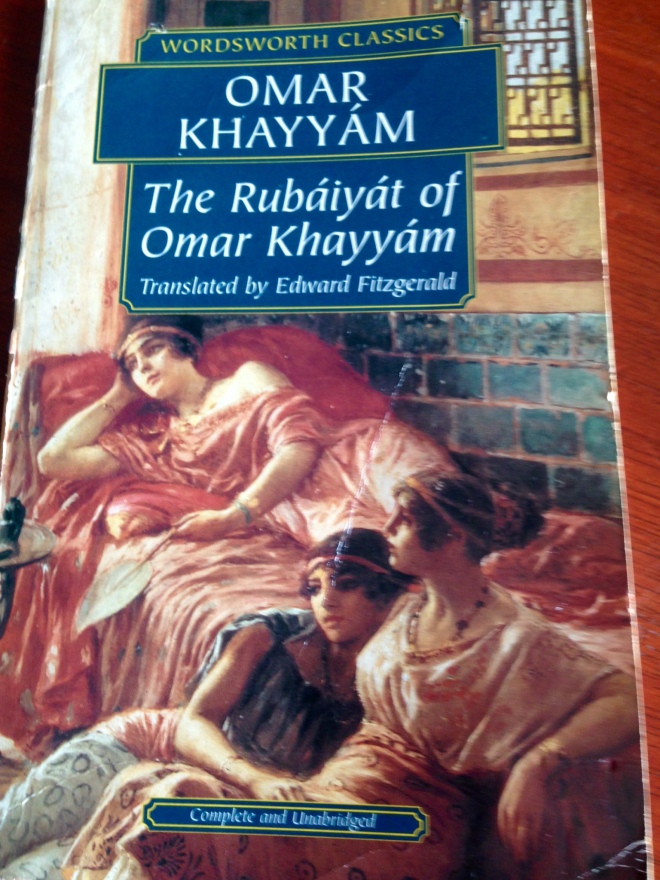
Title: The Rubaiyat of Omar Khayyam
Author: Omar Khayyam(1048 to 1141)
Translator: Edward Fitzgerald(First edition 1859)
The reason I decided to write on the Rubaiyat is because I feel the verses stir my heart and soul.
In my twenties, when talking existentialism was fashionable, I tried to link Khayyam’s poetry to the post world war philosophy. I found strains of nihilism in it…anything that I was looking for. Now, at fifty, I find wisdom and truth in it and catch glimpses of a borderless world, where humanitarian concerns have become a major issue.
Perhaps if we all believed in the things he says, there would be no wars, no peace keeping forces and no soldiers. It is truly ironic that we have to live in a world where they need to use cannon fodder, soldiers, weapons and destruction to maintain peace. Where has old Khayyam’s world disppeared? In one of his best known verses, he says
Here with a Loaf of Bread beneath the Bough,
A Flask of Wine, a Book of Verse—and Thou
Beside me singing in the Wilderness—
And Wilderness is Paradise enow.
Is this not what we all are looking for? I find these verses truly inspirational, passionate and profound.
Come, fill the Cup, and in the Fire of Spring,
The Winter Garment of Repentance fling
The Bird of Time has but a little way
To fly — and Lo! the Bird is on it’s Wing.
Khayyam has been viewed as a hedonist, a sufi, an atheist, a devout muslim. He was a mathematician, astronomer, philosopher and poet. His quatrains are like a fresh breath of life. His verses are profound and cover almost every aspect of existence. They span love, religion, philosophy, culture, wine and food…from the mundane to the divine.
The Moving Finger writes; and, having writ,
Moves on: nor all thy Piety nor Wit
Shall lure it back to cancel half a Line
Nor all thy Tears wash out a Word of it.
The fatalistic twist we see in Khayyam’s poetry is said to have been the handiwork of Edward Fitzgerald, the translator whose translation appeals to me the most. So, what has come down to us is not just the poet’s philosophy but also the translator’s own interpretation, a truly multi-cultural mix. Fitzgerald himself referred to this great creation as “transmogrification“. He wrote: “My translation will interest you from its form, and also in many respects in its detail: very un-literal as it is. Many quatrains are mashed together: and something lost, I doubt, of Omar’s simplicity, which is so much a virtue in him” (letter to E. B. Cowell, 9/3/58).
I find the mish-mash put forth by Edward Fitzgerald truly rhythmic and it brings out the flavour of mysticism and lyricism in the verses. There have been other translations but I stand by Edward Fitzgerald’s first edition as the best one.
Omar Khayyam is regarded as a great man. In 1970, they named a lunar crater after him. In 1980, a minor planet was named 3095Omarkhayyam. In 2009, Iran donated a scholar pavilion to the United Nations office in Vienna,featuring four great scholars from their culture. One of them is Omar Khayyam.
To me, these verses of Khayyam translated by Fitzgerald transcend all borders of time, nationality, religion and culture.
Edit
Very interesting commentary. I knew the book existed but I wouldn’t have imagined it to be as great as you described it. Will read it later. Thanks, looking forward for the next book recommendation.
Thanks.